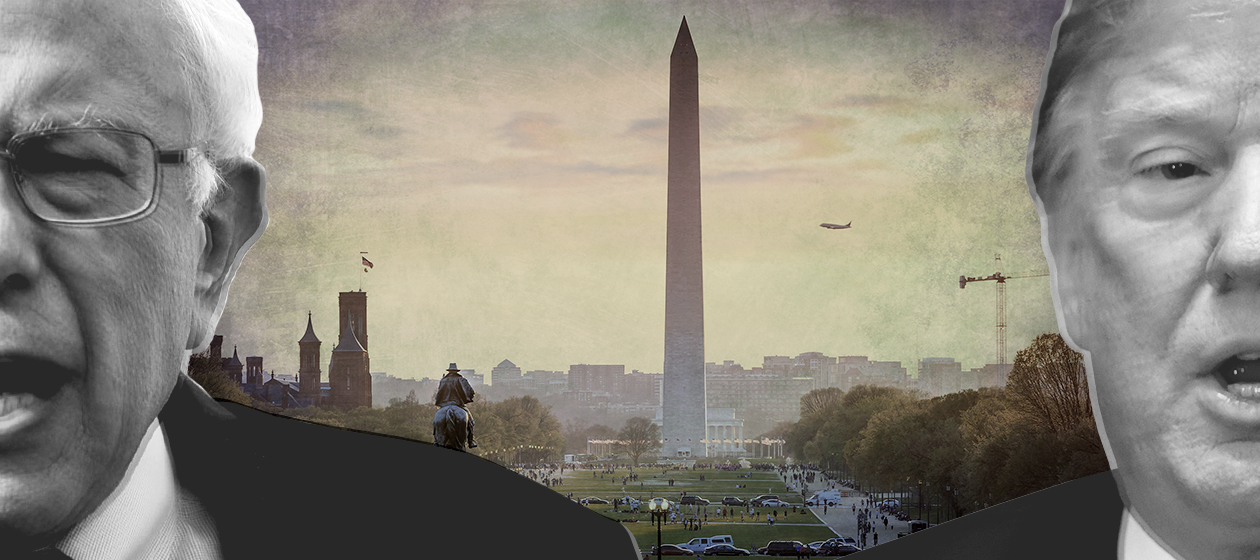The vanishing political center
The establishmentarian center was often cynical, and sometimes corrupt. I still miss it.


A free daily email with the biggest news stories of the day – and the best features from TheWeek.com
You are now subscribed
Your newsletter sign-up was successful
Washington's establishment guard is crumbling.
Veteran politicians such as House Minority Leader Nancy Pelosi (D-Calif.) and Senate Majority Leader Mitch McConnell (R-Ky.) are emblematic of an old order that is losing more power every day. In their stead, populist leaders are taking over both political wings in Washington, pushing Republicans and Democrats further to the left and to the right — and thus, further than ever from each other.
On the left, entrenched political leaders are losing power as Democrats move further left with politicians like Alexandria Ocasio-Cortez. Bernie Sanders-endorsed Democrat Andrew Gillum won his party's nomination for governor of Florida on Tuesday, and last month Sen. Dianne Feinstein lost the endorsement of the California Democratic Party to more progressive candidate Kevin de Leon, who said he wanted to give Californians a "real alternative to the worn-out Washington playbook." Throughout the midterms, Democrats running for office have distanced themselves from Pelosi, and many have said they will not vote for her as speaker if Democrats take back the House.
The Week
Escape your echo chamber. Get the facts behind the news, plus analysis from multiple perspectives.

Sign up for The Week's Free Newsletters
From our morning news briefing to a weekly Good News Newsletter, get the best of The Week delivered directly to your inbox.
From our morning news briefing to a weekly Good News Newsletter, get the best of The Week delivered directly to your inbox.
"If the Democratic Party is going to earn back the trust of the American people then we need to show them that we are serious about changing our politics — and that means we need a change in leadership," New York congressional candidate Max Rose told Politico.
It's become evident that Bernie Sanders — long seen as an outsider within Democratic ranks, too far to the left for its establishment bosses — is now directing the party's future by helping endorse and inspire its next generation of leaders. Eventually, as my colleague David Faris noted a few days ago, this young progressive left will be the party's new establishment.
Meanwhile, President Trump's ascendance to the head of the GOP has largely upset establishment politics on the right. Last year, a Harvard-Harris poll showed that McConnell had the lowest favorability of any elected official with a national profile, and House Speaker Paul Ryan didn't fare much better. The politicians winning midterm battles for the GOP are largely outsiders running on their support for Trump and their willingness to "blow up … and reinvent" Washington.
"The message being sent by Republican voters is clear: They want more Trumps, not fewer," Chris Cillizza wrote for CNN earlier this month. "The president was the leading edge of a movement fueled by anger and disappointment with Washington, not its conclusion. Even with him now in the most powerful political office in the country, Republicans remain unhappy with the sort of leadership they are getting out of Washington — and are ready to penalize anyone with a 'Rep.' in front of their names."
A free daily email with the biggest news stories of the day – and the best features from TheWeek.com
The consequences of these populist shifts are both good and bad. Having more politicians in Washington outside the establishment is likely to result in needed pushback on issues like foreign policy: Establishment politicians on both sides of the aisle (Hillary Clinton and Sen. Lindsey Graham, for instance) usually adopted a hawkish attitude to military campaigns abroad, often to the detriment of U.S. interests and the cost of American lives. We need politicians who will hold the U.S. accountable for its role in conflicts in Yemen and Libya, and consider more peaceful and diplomatic stances going forward.
We also need politicians who will fight crony capitalism and other forms of Washington corruption. The alliance of big business and big government should be alarming to both left and right — and fighting these corrupt alliances could help populists on the left and right find common ground.
But that common ground could be scarce following the death of the establishment. Data increasingly shows that our political parties are losing a center: Compared to 1994, Pew research indicates that today's median Democrat and median Republican have pushed to the far left and the far right, respectively. They are likely to disagree strongly on issues like immigration, welfare, gun control, abortion, and regulation. Because of this, compromise and agreement will be increasingly difficult both inside and outside Congress in days to come.
In this sense, the disappearance of establishment politicians could have severe consequences for national politics in coming years. The establishment on the left and right shared common ground and were willing to compromise when necessary. Often, voters hated them for it. And sometimes, their shared "common ground" was rather cronyist. But when one considers the gridlock that has characterized Congress over the past several years, during both Barack Obama and Donald Trump's presidencies, it's obvious that this new center-depleted status quo will come with its own challenges. A populism of the hard right and the hard left, without some sort of establishment center, will likely foment growing anger and gridlock in days to come.
Welcome to the new normal.
Gracy Olmstead is a writer and journalist located outside Washington, D.C. She's written for The American Conservative, National Review, The Federalist, and The Washington Times, among others.
